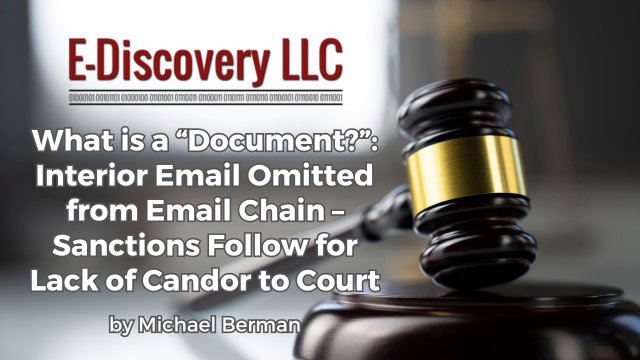
[EDRM Editor’s Note: The opinions and positions are those of Michael Berman.]
In Golat v. Wisconsin State Court System, 2025 WL 2466697 (W.D. Wis. Aug. 27, 2025)(“Golat II”), the court wrote that omitting a relevant email that was contained in an email chain violated counsel’s duty of candor to the court.
This blog is an update of Half-Baked Motion to Compel Was Not Prompt, Not Ripe, Not Complete, and Not Likely to Succeed – E-Discovery LLC (Aug. 22, 2025)(“Golat I”).
In Golat I, the court denied without prejudice plaintiff’s motion to compel production of documents on defendants’ privilege log. Plaintiff’s counsel had stated that he produced “a true and correct copy of an email thread” with defense counsel about the timing of a discovery dispute.
That statement was incorrect. In the court’s words: “But the copy counsel attached was not true and correct because it omitted an email from the thread. The omitted email showed ‘the parties were communicating about the privilege log and had reached an understanding on approach and timeframe.’” [emphasis added]. In Golat I, the court entered a show cause order demanding an explanation.
In Golat II, after review of plaintiff’s response, the court permitted defendants to request recovery of their attorneys’ fees in opposing plaintiff’s earlier motion.
The court wrote:
Plaintiff’s counsel reports that he omitted the email from the thread, not through any neglect, but because he thought it was “cumulative and not materially different from the communications that were provided.” … Counsel further explains that he did not think the email was “material to the narrative” because he did not receive a reply from defendants’ counsel.
Golat v. Wisconsin State Court System, 2025 WL 2466697 (W.D. Wis. Aug. 27, 2025).
Plaintiff’s counsel reports that he omitted the email from the thread, not through any neglect, but because he thought it was “cumulative and not materially different from the communications that were provided.”
Golat v. Wisconsin State Court System, 2025 WL 2466697 (W.D. Wis. Aug. 27, 2025).
The Golat II court disagreed: “To be clear, the omitted email was not the final email in the chain, nor the first.” In my words, counsel produced a peanut-butter-and-jelly sandwich, without the peanut butter or jelly.
The court described what was missing. Defendants had made a proposal by email. In the omitted email, plaintiff’s counsel responded, but did not raise any concerns with defendants’ proposed timeline or plan. The court wrote:
The omitted email was not “cumulative.” Rather, the July 25 afternoon email exchange shows that defendants’ counsel was attempting to resolve the dispute and plaintiff’s counsel had no objection to the proposal, undercutting any argument that defendants’ counsel had outright refused to meet and confer…. It appears plaintiff’s counsel selected the emails that bolstered the motion to compel, while leaving out the less-favorable portion. This is problematic, and plaintiff’s counsel’s protests to the contrary are unpersuasive. [emphasis added].
Id.
It appears plaintiff’s counsel selected the emails that bolstered the motion to compel, while leaving out the less-favorable portion. This is problematic, and plaintiff’s counsel’s protests to the contrary are unpersuasive.
Golat v. Wisconsin State Court System, 2025 WL 2466697 (W.D. Wis. Aug. 27, 2025).
The Golat II court wrote that counsel have a duty of candor to the court:
In the context of discovery disputes, this means that counsel must provide the court with a complete and accurate recounting of the parties’ correspondence relating to the dispute. It is the court’s role, not counsel’s role, to decide what portions of the correspondence matter. Going forward, plaintiff’s counsel must take better care to adhere to these points. [emphasis added].
Id.
The court wrote:
The loser of a motion to compel under Federal Rule of Civil Procedure 37(a) must presumptively pay the other side’s expenses, including attorney fees, absent a showing of substantial justification. …. This fee-shifting presumption encourages parties to work hard on resolving discovery disputes amongst themselves and to reserve motion practice for only those disputes that are ripe for the court’s consideration.
Id.
The Golat II court set a briefing schedule for a request by defendants for reasonable expenses incurred in opposing the motion to compel.
Back in the days of paper-based litigation, it was rare to argue over the definition of a “document.” Usually, it was clear where a letter, memo, or contract began and ended. But, ESI is much different than paper and recent cases bring that issue to the forefront. What is a “Document?” – E-Discovery LLC
In Golat II, the missing email was, in my words, part of the “document.” When it comes to ESI, a good question to ask is “What is a document?” See:
- Sedona Conference Commentary on Discovery of Collaboration Platforms – What is a Document? – E-Discovery LLC;
- Uber Technologies – Another Hyperlink Decision – E-Discovery LLC;
- “Modern Attachments” or “Pointers”- What is a Document? (Part IV) – E-Discovery LLC;
- What is a Document? (Part III) – E-Discovery LLC;
- What is a Document? (Part II) – E-Discovery LLC.
Assisted by GAI and LLM Technologies per EDRM GAI and LLM Policy.


